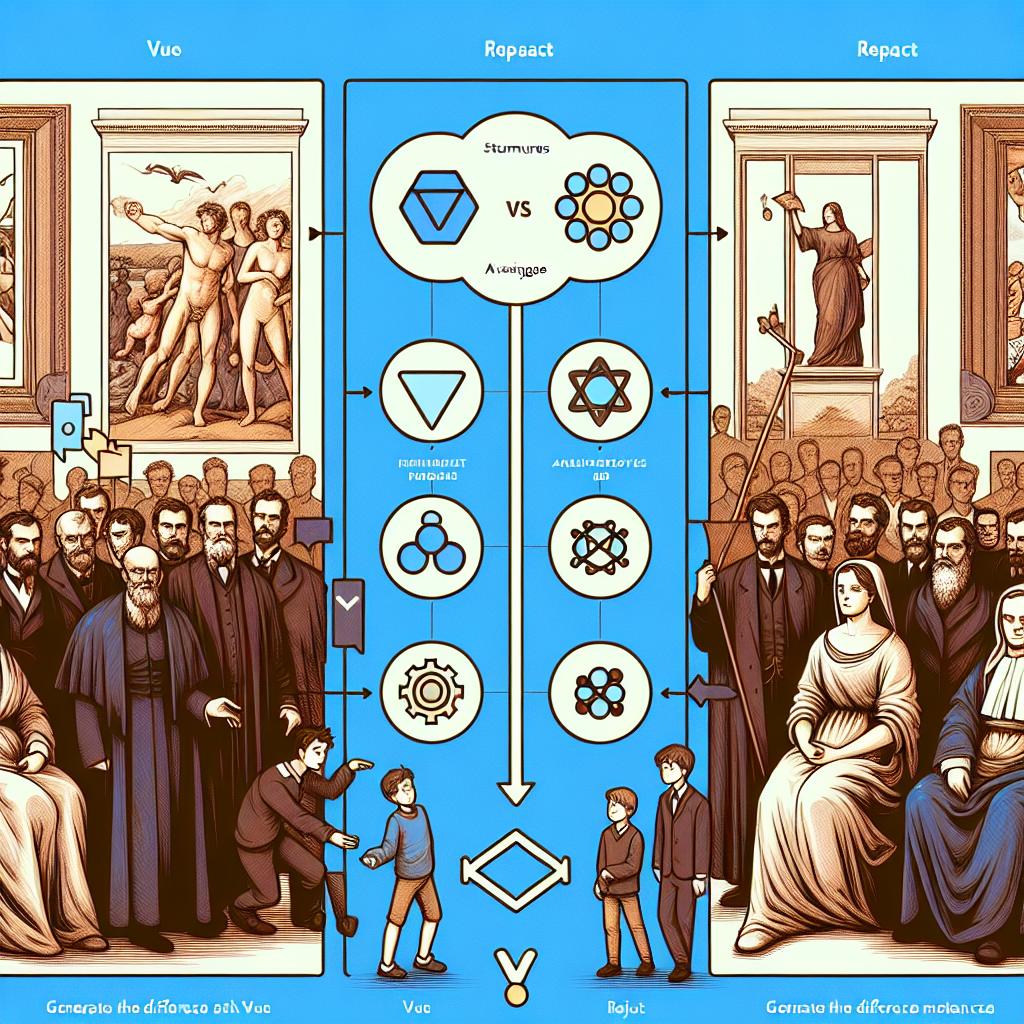Advantages of React and Vue: Comparing Differences and Popularity

Comparison of React and Vue: What’s Common and What Are the Differences in 2023?

If youre venturing into web development or planning to upgrade your existing application, youve likely heard of React and Vue. These frameworks have become immensely popular, but have you ever wondered about their key differences and similarities? Lets dive into a detailed examination of these two giants in the tech arena, particularly for 2023.
According to recent statistics, around 72% of developers are familiar with React, while 33% prefer Vue. This indicates a strong preference for React due to its extensive community support. However, Vue is not far behind. Lets explore how they stack up against each other in various aspects.
Key Similarities: What Do React and Vue Share?
- ⭐ Component-Based Architecture: Both frameworks utilize a component-based architecture, allowing developers to create reusable components. This reduces redundancy and improves maintainability.
- ⭐ Reactive Data Binding: React and Vue provide reactive data binding, ensuring any changes to data are reflected in the UI seamlessly.
- ⭐ Large Ecosystem: Both have vast ecosystems with plenty of tools, libraries, and community plugins to enhance functionality.
Differences Between React and Vue: A Deeper Look
| Feature | React | Vue |
|---|---|---|
| ⭐ Learning Curve | Steeper | Smoother |
| ⭐ State Management | React Context, Redux | Vuex |
| ⭐️ UI Library | No built-in; relies on additional libraries | Vue CLI offers a complete out-of-the-box solution |
| ⭐ Popularity | Higher among large corporations | Popular among startups and medium-sized businesses |
| ⭐ Flexibility | Highly flexible, but may lead to complexity | More opinionated structure, easier to grasp |
| ⭐️ Community Support | Vast resources and community | Active, but smaller community |
| ⭐ Mobile Development | React Native | Vue Native |
| ⭐ Performance | Optimized for larger applications | Efficient for smaller projects |
| ⭐ Integration | Ease of integration with other libraries | Easy to integrate into existing projects |
| ⭐ Documentation | Comprehensive | Extremely beginner-friendly |
Real-Life Scenarios: Recognizing Your Needs
Consider this: Youre a startup owner looking to launch an MVP (Minimum Viable Product). Reacts flexibility might suit your need for complex UI components. However, if youre seeking rapid development and easier learning, Vue could be your best friend. For instance, many developers have shared stories of successfully using Vue to quickly prototype applications that need to scale later.
Another common scenario involves the choice between the two frameworks when refactoring an existing application. Let’s say you’ve been using Vue but your company aims for broader reach. Transitioning to React might initially seem daunting due to its steep learning curve. However, many developers have reported successful transitions, backed by the vast resources available in the React community.
Expert Insight: Making the Right Choice for Your Project
Choosing between React and Vue really boils down to your projects specific needs and your team’s expertise. Industry experts often recommend considering the following:
- ⭐ Your timeline: If the project is time-sensitive, Vue might be the quicker option.
- ⭐ Your team’s skill set: If your developers are more comfortable with one framework, don’t fight that instinct.
- ✨ Project Scale: For larger applications, React might be more beneficial due to its robust ecosystem.
We at Artivale offer a full spectrum of IT services, helping you navigate these decisions and ensuring your application’s success. With 20 years of experience and a team of professional specialists, we are the only company in providing comprehensive solutions all in one place. Have questions? Contact our customer relations manager, Alexandra, at [email protected] or visit artivale.com to learn more about our services.
Ready to take the plunge with your web development project? ⭐ Call us today or sign up for our services online!
Frequently Asked Questions
- What is React? React is a JavaScript library for building user interfaces, particularly for single-page applications.
- What is Vue? Vue is a progressive framework for building user interfaces, focusing on easy integration and simplicity.
- How does Vue.js differ from React? Vue has a more opinionated structure while React offers more flexibility.
- What are the advantages of Vue? Vue is easier for beginners, offers excellent documentation, and provides rapid development capabilities.
- What are the advantages of React? Reacts component structure and ecosystem provide extensive flexibility for building complex applications.
- Which is better for mobile development? React Native is widely used, but Vue also has options for mobile development.
- Can you use React and Vue together? Yes, both can coexist in the same project, but its often not advised due to increased complexity.
- How does community support compare? React has a larger community, providing extensive resources, while Vues community is smaller but very supportive.
- Are there performance differences? Generally, React is optimized for larger applications, while Vue is efficient for smaller projects.
- What factors should I consider when choosing between the two? Consider your project needs, timelines, and your teams familiarity with either framework.
How Does Vue.js Differ from React: Architecture and Popularity Insights for Developers?

If youre diving into the world of web development and curious about how Vue.js and React differ, youre in the right place! These two powerful frameworks are widely recognized, each with its own strengths and communities. Lets break down their architectures and popularity insights to help you determine which might be the better fit for your next project.
Understanding the Architecture: Vue vs. React
When it comes to architecture, both Vue.js and React employ component-based structures, but they have distinct approaches that cater to different developer needs.
- ⭐ Reacts Architecture: React uses a virtual DOM, which helps optimize rendering performance. This means that changes to the UI can be efficiently computed and only the necessary components are updated. Its flexibility allows developers to integrate with other libraries but could sometimes lead to complexity, especially for beginners.
- ⭐ Vues Architecture: Vue also uses a virtual DOM, but it takes a more opinionated approach. Vue allows two-way data binding out of the box, making it intuitive for developers looking to create interactive interfaces quickly. Its single-file components encapsulate HTML, CSS, and JavaScript, providing a straightforward way to manage components.
For instance, if you’re a solo developer trying to build an application quickly, Vues structure can be very appealing. On the flip side, if you’re part of a larger team or tackling a more complex project, Reacts flexibility might provide the solutions you need.
Popularity Insights: Trends in 2023
As of 2023, both frameworks possess their own loyal communities, but they cater to slightly different demographics and project needs. Did you know that according to recent statistics, about 40% of developers prefer React compared to only 18% who favor Vue? This popularity can be attributed to several factors:
- ⭐⭐ Career Opportunities: With React’s strong adoption in large corporations, knowledge of React often leads to a greater number of job opportunities. This presents an attractive option for developers looking to enhance their careers.
- ⭐ Community Support: React boasts a larger community, which translates to extensive resources, tutorials, and libraries. This can be a significant advantage if you’re looking for support during development.
- ⭐ Company Backing: React, developed by Facebook, is used in many of their applications, ensuring ongoing support and updates. This degree of backing can instill confidence in organizations considering which framework to adopt.
- ⭐ Growing Interest in Vue: However, Vue has seen a steady rise, especially among startups and developers who appreciate its simplicity and quick onboarding process. Its versatility for smaller projects often leads to enthusiastic endorsements from developers who prefer a smooth learning curve.
Consider a scenario where a startup decides between the two frameworks. If their primary goal is to rapidly develop and iterate on a product, Vue could be ideal. On the other hand, if the team is looking to scale and already has experience with React, they might opt for React despite the steeper learning curve.
Real Developer Experiences: Insights from the Field
Real-world experiences can shed light on the architectural advantages of both frameworks. For example, a small team developed an online store using Vue due to its fast setup and learning curve. They rapidly built components and achieved a functional product within weeks. In contrast, another team developing a large-scale enterprise application chose React for its flexibility and support for integrating various libraries, making it easier to handle complex state management.
Both frameworks have their strengths, tensions, and charming quirks! Understanding them will empower you as a developer to make choices that align with your project requirements.
At Artivale, we help businesses navigate these choices, ensuring they select the right technologies to bring their ideas to life. With over 20 years of experience, our professional specialists can guide you through web development hurdles. Want to learn more? Reach out to our customer relations manager, Alexandra, at [email protected] or visit artivale.com to gain insights into our services.
Are you ready to kickstart your development journey? ⭐ Contact us or sign up for our services online today!
Frequently Asked Questions
- What is the main difference in architecture between React and Vue? React uses a flexible, component-based architecture with a virtual DOM, while Vue has a more opinionated structure with two-way data binding.
- Which framework has better performance? Both frameworks offer good performance, but React can be more efficient for larger applications due to its virtual DOM optimizations.
- Why is React more popular than Vue? React’s extensive community support, backing by Facebook, and larger job market opportunities contribute to its popularity.
- Can I use React and Vue together? Yes, both can be integrated within the same project, but it’s generally advised against due to increased complexity.
- Which framework is more suitable for beginners? Vue is often favored by beginners due to its simplicity and straightforward learning curve.
- How does community support differ? React has a larger community with more resources available, while Vue has a smaller, but passionate community.
- What type of projects suit React better? Larger, scalable applications where complex state management is required typically benefit more from React.
- How quickly can I develop a project using Vue? Developers can often build applications in weeks using Vue due to its rapid setup and ease of use.
- Is there a significant difference in cost when hiring developers? React developers may have higher demand and salaries compared to Vue developers, reflecting their popularity.
- What factors should I consider when choosing between React and Vue? Consider your team’s expertise, project scale, and desired development speed when making your choice.
What Are the Advantages of Vue Compared to React in Modern Web Development Trends?

As web development continues to evolve, developers are faced with an essential choice: which framework to utilize for their projects? Vue.js and React are both powerful contenders, but what advantages does Vue offer in the context of modern web development trends? Let’s uncover the unique benefits that make Vue a popular choice among developers today.
1. Simplicity and Ease of Learning
One of the greatest advantages of Vue is its gentle learning curve. Developers often find it easier to get started with Vue due to its straightforward syntax and well-structured documentation. This accessibility allows newcomers to quickly grasp concepts without feeling overwhelmed. Consider a fresh graduate entering the tech field; a Vue.js project could be a more approachable first step compared to the complex ecosystem of React.
- ⭐ Comprehensive Documentation: Vue provides extensive documentation, guiding developers through various features and best practices, making onboarding a breeze.
- ⭐⭐ Familiar Concepts: If youre already acquainted with HTML, CSS, and JavaScript, youll love how Vue leverages these technologies, minimizing the need for heavy JavaScript knowledge.
2. Two-Way Data Binding
Vues two-way data binding capability is often cited as a significant advantage, particularly for applications that require real-time updates. This feature allows changes in the model to reflect immediately in the view, and vice versa. This can be especially beneficial when developing forms, chat applications, or other interactive features.
Think of a scenario: Developers building an online survey tool can implement Vue to ensure that any changes made in the form inputs instantly reflect in the user interface. This enhances user experience and responsiveness.
3. Flexibility and Integration
Vue strikes a remarkable balance between being a full-fledged framework and a lightweight library. Its flexibility allows developers to adopt it incrementally—starting from small projects or components and gradually expanding. This makes Vue extremely adaptable for various kinds of applications, whether they are small SMEs or large enterprise-level systems.
- ⭐️ Seamless Integration: Vue can be effortlessly integrated into existing projects. Its architecture accommodates developers wishing to implement it into a part of a larger application without a complete overhaul.
- ⭐️ Single File Components: Vue’s single-file components encapsulate HTML, CSS, and JavaScript, ensuring neat organization and fostering better collaboration among team members.
4. Better Performance with Smaller Footprint
In terms of performance, Vue.js tends to be lighter than React, leading to faster load times—a crucial factor in today’s web ecosystem where user retention heavily relies on speed. With its optimized rendering capabilities, Vue ensures that updates are efficient and provide a smooth experience for users.
Recent statistics reveal that websites built with Vue often show up to 20% faster loading times compared to similar sites developed with other frameworks. This can be a game-changer for businesses aiming to retain customers.
5. Community and Ecosystem Growth
Although React has dominated the scene for a while, Vues community is growing at an impressive rate, leading to an expanding ecosystem of plugins, tools, and libraries. The support from experienced developers has fostered the creation of numerous plugins that make development easier and faster.
- ⭐ Vibrant Community: Vue has an enthusiastic community that is eager to help newcomers. With ample resources such as tutorials and forums, developers can find support and guidance quickly.
- ⭐ Rich Ecosystem: From state management tools like Vuex to routing functionalities with Vue Router, developers have a variety of tools to enhance their development experience.
6. Strong Focus on UI/UX
Vue has been designed with user experience in mind. Its simplicity and structure allow developers to build visually appealing applications without sacrificing functionality. The framework encourages clean, maintainable code that ultimately enhances the user interface and user experience.
For example, companies working on e-commerce platforms find Vue advantageous as it enables them to create highly engaging and responsive websites that lead to higher conversion rates.
At Artivale, our team of talented professionals is well-versed in Vue development, ready to help you leverage its strengths for your specific project needs. With over 20 years of experience in the industry, we provide comprehensive solutions tailored to your business goals. Ready to take your web application to the next level? Reach out to our customer relations manager, Alexandra, at [email protected] or visit artivale.com for more information.
Are you excited to get started with Vue for your next project? ⭐ Call us or sign up for our services online today!
Frequently Asked Questions
- Why is Vue easier to learn than React? Vues syntax is more intuitive, and its comprehensive documentation provides a smoother onboarding experience for newcomers.
- What is two-way data binding in Vue? This feature allows data changes to be reflected in the user interface instantly, enhancing interactivity.
- How does Vues performance compare to React? Vue typically has a smaller footprint, leading to faster loading times and improved performance.
- Can I integrate Vue into an existing project? Yes! Vue is designed for seamless integration and can be used incrementally.
- What are single-file components in Vue? Single-file components encapsulate HTML, CSS, and JavaScript in a single file, promoting better organization.
- How is the community support for Vue? The Vue community is vibrant and supportive, with ample resources available for both beginners and experienced developers.
- Are there specific industries where Vue excels? Vue is particularly strong in startups and small to medium-sized enterprises that require rapid development.
- What tools are popular within the Vue ecosystem? Tools like Vuex for state management and Vue Router for navigation are widely used and well-supported.
- Is it possible to build a large application using Vue? Absolutely! Vue can handle large applications efficiently, especially with its component-based architecture.
- What is the future of Vue in web development? Vues popularity is growing, and its community is expanding rapidly, making it a refreshing choice for various projects.
Submit your details in the form and our team will personally get in touch with you within the next business day to discuss your needs
